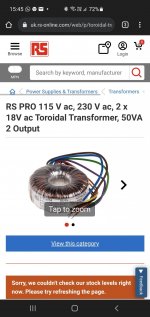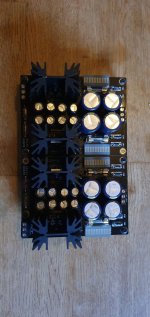Hi Salas,
thank you for an excellent design. I build it (DCG3) with two SSLV 1.3 and it is fantastic! Now I was thinking of replacing AD823 with two single OP amps with the intention to separate ground trace of left and right channel to get better 'stage'. Would this have sense and would OPA1641 be good one?
Thanks.
Matjaz
thank you for an excellent design. I build it (DCG3) with two SSLV 1.3 and it is fantastic! Now I was thinking of replacing AD823 with two single OP amps with the intention to separate ground trace of left and right channel to get better 'stage'. Would this have sense and would OPA1641 be good one?
Thanks.
Matjaz
Separation maybe you could score few dB more in the HF with dual servo, but not sure. Always use Fet input op-amp for such in DCG3. There is 1MΩ source impedance filter so you need pA level input bias current and input offset current chip.
Thus the OPA1641 is technically compatible. In my experience a detailed but bit cold tonal result also. Subjectively speaking in DCG3 servo position if it will be like the OPA1642 I had tried.
Thus the OPA1641 is technically compatible. In my experience a detailed but bit cold tonal result also. Subjectively speaking in DCG3 servo position if it will be like the OPA1642 I had tried.
Final question, I'm using two DCSTB boards (one for each channel), the DCG-3 board, an i-select board and a board (6.3v to 15v AC or 6.3v to 15v DC) for powering the TKD 2cp-2511.
Do I need a transformer for each DCSTB board and the output on the i-select board should power the board for the potentiometer?
Do I need a transformer for each DCSTB board and the output on the i-select board should power the board for the potentiometer?
One DCSTB board has two independent +/0/- sections. You use two ~/0/~ transformers to power each of the sections. Then you take positive/0 raw DC under board from the +- pins of a reservoir capacitor with a pair of wires. You send that to the DCin of Iselect. The selector board has a local 7812 regulator to feed its input relays but also enough spare to get from its 12V DCout connector for peripherals. Like your motorized volume pot. Don't populate the rectification diodes on the Iselect and put a sink on its 7812.
Does the 7812 need isolating from the heatsink?
Two transformers per channel? Not a transformer with 4 output wires (ac-ct-ac) and combine the two centre wires as a centre tap?
I think I've caused confusion with my terminology, I've built the DCSTB (see image which is 1 large board with 2 mirror image rails on it) and was going to order 2 transformers to power it (other image).
Two transformers per channel? Not a transformer with 4 output wires (ac-ct-ac) and combine the two centre wires as a centre tap?
I think I've caused confusion with my terminology, I've built the DCSTB (see image which is 1 large board with 2 mirror image rails on it) and was going to order 2 transformers to power it (other image).
Attachments
The input selector's 7812 does not strictly need isolation. Given no ground potential will be ever touching its sink. You may isolate it if in danger to be touched by accidental probing, stray wires, a chassis lid, etc.
Each DCSTB independent section has an AC CT AC input connector. As seen at the right side on your photograph. You need one transformer per channel/section. Two in total. Ending up with a true dual mono PSU.
For a 2X18 named Tx with four wire outputs, you connect its outer secondary wires to each AC point and their middle wires together to the CT point (center tap). That creates the zero return mid point.
Each DCSTB independent section has an AC CT AC input connector. As seen at the right side on your photograph. You need one transformer per channel/section. Two in total. Ending up with a true dual mono PSU.
For a 2X18 named Tx with four wire outputs, you connect its outer secondary wires to each AC point and their middle wires together to the CT point (center tap). That creates the zero return mid point.
Thanks Salas, that's how I thought it went, I'd just confused myself when reading your first reply.The input selector's 7812 does not strictly need isolation. Given no ground potential will be ever touching its sink. You may isolate it if in danger to be touched by accidental probing, stray wires, a chassis lid, etc.
Each DCSTB independent section has an AC CT AC input connector. As seen at the right side on your photograph. You need one transformer per channel/section. Two in total. Ending up with a true dual mono PSU.
For a 2X18 named Tx with four wire outputs, you connect its outer secondary wires to each AC point and their middle wires together to the CT point (center tap). That creates the zero return mid point.
50va enough to take of the capacitor for the i-select and motorised pot?
50VA is a royal spec I recommended right from the start. For low impedance and no heat. Can take all that with ease.
When you say reservoir capacitor are you referring to one of the 4 large capacitors on the DCSTB board?
Hi Salas,
I'm using a hifi2000 case with one of the pierced bases (260mm x 315mm) will that be enough heatsink for the dcg-3 or will I need more (like the aluminium block in one of your builds)?
I'm using a hifi2000 case with one of the pierced bases (260mm x 315mm) will that be enough heatsink for the dcg-3 or will I need more (like the aluminium block in one of your builds)?
Hi, the perforated plate has enough mass but it's not a continuous surface, better use an aluminum interface block and some thermal paste between it and the base. Does not have to be a massive thick block. Smooth it a little with sandpaper also. Especially where the MOSFETs attach to it.
Ok I'm getting to the point of testing the boards, I have the internal layout decided to get the i-select board and transformers as far apart as possible.
How do I connect the i-select board to the dcg-3 board? I'm assuming from the output of i-select to line in on the dcg-3 and then line out to output rca's?
How do I connect the i-select board to the dcg-3 board? I'm assuming from the output of i-select to line in on the dcg-3 and then line out to output rca's?
You got a DCG3? Don't remember you with one. Or using the Select in another preamp?
Anyway, check if there's voltage across the relay diode of that position first. Maybe one relay died?
Anyway, check if there's voltage across the relay diode of that position first. Maybe one relay died?
Removed the muses volume again. Something was not quite right.
Back with normal bourns 25k pot.
Just a quick measurement before I go to bed. (self noise)
I got about 0.0003%THD now.
So I am where it supposed to be.
Now I am using screened (coax) cables from the I-select board to the dcg3..
Cables here picks up everything. Even the coaxes needs to be bundled tight together.
Just touching, moving a bit gets quite big results on scope.
Will do some more testing tomorrow.

Back with normal bourns 25k pot.
Just a quick measurement before I go to bed. (self noise)
I got about 0.0003%THD now.
So I am where it supposed to be.
Now I am using screened (coax) cables from the I-select board to the dcg3..
Cables here picks up everything. Even the coaxes needs to be bundled tight together.
Just touching, moving a bit gets quite big results on scope.
Will do some more testing tomorrow.
That's really silent grass no doubt. 0.0003% THD and -119 dBFSA SNR are very cool for your DCG3 build. What audio analyzer is this you're using?
The spikes at -130 dBFS and below are so low they could be interference from just looking at it the wrong way.
A tiny Tx field tail reaching, a mains chord's magnetic field, a powered fixture in the room. Whatever. Are they also there in the analyzer's self loop if you will use the same test leads layed out at the same place?
The spikes at -130 dBFS and below are so low they could be interference from just looking at it the wrong way.
A tiny Tx field tail reaching, a mains chord's magnetic field, a powered fixture in the room. Whatever. Are they also there in the analyzer's self loop if you will use the same test leads layed out at the same place?
- Home
- Source & Line
- Analog Line Level
- Salas DCG3 preamp (line & headphone)

